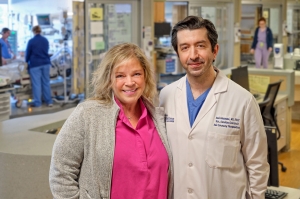Cardiogenic shock is the most severe form of heart failure for which patients require rapid assessment by an expert clinical team. This team implements the best clinical plan to support the patient’s immediate needs, while evaluating a longer-term management plan. We have an experienced team available 24/7 for a rapid triage of patients with cardiogenic shock.
At the Gagnon Cardiovascular Institute, we have the ability to transport patients with or without acute mechanical circulatory support to Morristown Medical Center, where our dedicated expert team of medical, surgical and interventional colleagues, along with our highly trained advanced practice providers and nurses, care for patients in our state-of-the-art Cardiac Care Unit.
Our team offers the most advanced devices including, intra-aortic balloon pump, percutaneous and surgical left and right ventricular assist devices (VAD’s) and extracorporeal membrane oxygenation (ECMO), which can support a failing heart as a bridge to recovery or a long term support solution.
-
What causes cardiogenic shock?
-
The most common cause of cardiogenic shock is a heart attack. A heart attack can damage and weaken the heart, causing inadequate blood flow to the rest of the body and organs. Cardiogenic shock can also result from:
- Mechanical complications of heart attack such as rupture of heart valves or parts of the walls of the heart
- Acute worsening of chronic heart failure (due to variety of medical reasons)
- Serious life-threatening arrhythmias
- Myocarditis (inflammation of the heart muscle)
- Endocarditis (infection of the heart valves)
- After heart surgery
- Stress induced cardiomyopathies (heart failure due to systemic illness)
-
What are the symptoms of cardiogenic shock?
-
Possible symptoms of cardiogenic shock:
- Severe shortness of breath
- Sudden, rapid heartbeat (tachycardia)
- Loss of consciousness
- Weak pulse
- Low blood pressure (hypotension)
- Sweating
- Pale skin
- Cold hands or feet
- Urinating less than normal or not at all
- Mechanical complication of heart attack
-
How do we treat cardiogenic shock?
-
Patients with cardiogenic shock require immediate attention and a multidisciplinary team approach to sustain life-saving blood flow and oxygen delivery to the entire body. There are several treatment options for cardiogenic shock, often including one or more of the following:
- Intravenous medications to increase the heart’s ability to pump and maintain adequate blood pressure
- Angioplasty and stenting of the heart vessels to restore blood flow
- Repair of the mechanical complications of a heart attack, either with minimally invasive percutaneous approach, or with open heart surgery
- Acute mechanical circulatory support devices to assist the failing heart and provide adequate blood circulation in order to stabilize the patient and address the acute issues
Request More Information
Please use the form to request more information.
All fields are required.
Please note that this form is for North American residents only.
Related Articles
27-Year-Old Gets Lifesaving Heart Transplant
At just 27 years old, Kenneth B.’s heart was failing. Morristown Medical Center’s cardiogenic shock team and NYU Langone’s Transplant Center restored his heart, his health, and his life.
From Sparta to Manhattan: A Lifesaving Heart Care Team
Discover Karin's inspiring journey from Sparta to Manhattan: Read about her lifesaving cardioversion procedure and critical heart care at Atlantic Health System.

